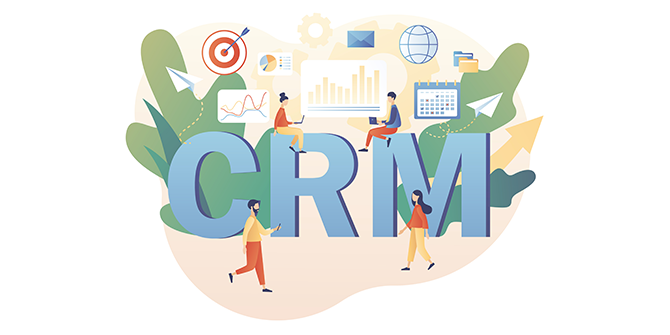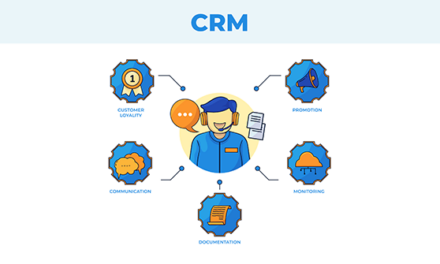Marketing consultancies are often advised to “know their customers well to beat their competition.”
Okay, we may have taken some creative liberties with that one, but the fact remains: understanding your customers is the key to creating effective marketing strategies that drive business growth.
That’s where customer relationship management (CRM) software comes in – it’s like a superhero sidekick for marketing consultancies.
With CRM software, you can store and analyze all your customer data in one centralized location, making it easy to get a 360-degree view of your customers and their interactions with your brand.
You can create targeted marketing campaigns based on customer data, such as demographics, purchase history, and engagement levels.
Plus, you can track and measure the effectiveness of your marketing strategies, using data-driven insights to make smarter decisions about where to invest your time, energy, and resources.
Think of CRM software as a trusty sidekick that helps you slay the competition by arming you with the knowledge you need to create killer marketing strategies.
So, grab your cape, and let’s explore six stellar ways marketing consultancies can use CRM software to level up their marketing game.
6 Stellar Ways to Use CRM For Marketing Consultancies

Centralizing and streamlining data
CRM software allows marketing consultancies to centralize customer data, including contact information, purchase history, and demographic data.
By centralizing customer data, marketing consultancies can streamline their operations, making it easier to manage and access customer information.
Some ways that marketing consultancies can streamline data using CRM include:
- Automatic data entry: CRM software can automatically input customer data from various sources, such as social media, email, and website forms, reducing the need for manual data entry.
- Consolidation of data: CRM software allows marketing consultancies to consolidate customer data from various sources into a single database, making it easier to manage and analyze.
- Customized data views: CRM software enables marketing firms to personalize how they view client data, making it simpler for them to obtain the data they require quickly.
Creating targeted campaigns
CRM software enables marketing consultancies to create more targeted and personalized marketing campaigns. Using the data stored in the CRM, marketing consultancies can segment customers based on their demographics, interests, and behavior. Some ways that marketing consultancies can create targeted campaigns using CRM include:
- Personalized messaging: Marketing consultancies can use the data stored in the CRM to personalize marketing messages, increasing the chances of engagement and conversion.
- Segmentation: Marketing consultancies can segment their customers based on demographics, interests, and behavior, allowing them to create more targeted campaigns that resonate with specific customer groups.
- Triggered campaigns: Marketing consultancies can create triggered campaigns based on customer behavior, such as abandoned carts or website visits, increasing the chances of conversion.
Improving customer experience
CRM software can help marketing consultancies improve their customer experience by providing them with valuable insights into their customers’ needs and preferences.
By using the data stored in the CRM, marketing consultancies can provide more personalized and relevant experiences for their customers.
Some ways that marketing consultancies can improve customer experience using CRM include:
- Personalized communication: Marketing consultancies can use the data stored in the CRM to personalize communication with their customers, such as addressing them by name or sending relevant content based on their interests.
- Predictive analytics: CRM software can provide marketing consultancies with predictive analytics, allowing them to anticipate customer needs and provide proactive solutions.
- Customer feedback: CRM software allows marketing consultancies to collect and analyze customer feedback, providing them with valuable insights into their customers’ needs and preferences.
Enhancing sales process
CRM software offers valuable insights into customer behavior and preferences, which can help marketing consultancies improve their sales process.
By using the data stored in the CRM, marketing consultancies can improve their lead generation, qualification, and conversion processes.
Using CRM, marketing consultancies can improve their sales process in a number of ways, such as:
- Lead scoring: Marketing consultancies can use the data stored in the CRM to score leads based on their behavior and demographics, allowing them to prioritize leads based on their likelihood of conversion.
- Sales automation: CRM software can automate the sales process, such as sending follow-up emails or reminders, reducing the need for manual intervention.
- Sales forecasting: CRM software can provide marketing consultancies with sales forecasting capabilities, allowing them to anticipate sales revenue and adjust their sales strategy accordingly.
Tracking and measuring results
Customer relationship management (CRM) software allows marketing consultancies to track and measure the results of their marketing campaigns, allowing them to assess the effectiveness of their strategies and make data-driven decisions.
Some ways that marketing consultancies can track and measure results using CRM include:
- Campaign analytics: CRM software can provide marketing consultancies with campaign analytics, such as open rates, click-through rates, and conversion rates, allowing them to measure the effectiveness of their campaigns.
- ROI measurement: CRM software allows marketing consultancies to track the return on investment (ROI) of their marketing campaigns, enabling them to make data-driven decisions about their marketing budgets and strategies.
- Customized reporting: CRM software allows marketing consultancies to generate customized reports based on their specific needs, providing them with valuable insights into their marketing performance.
Integrating with other marketing tools
CRM software can be integrated with other marketing tools, such as email marketing software, social media management tools, and analytics software, allowing marketing consultancies to streamline marketing operations and improve marketing performance.
Incorporating CRM with other marketing technologies can be done in several ways by marketing consultants, such as:
- Email marketing integration: CRM software can be integrated with email marketing software, allowing marketing consultancies to send personalized emails based on customer data stored in the CRM.
- Social media integration: CRM software can be integrated with social media management tools, allowing marketing consultancies to manage their campaigns and track social media engagement using the data stored in the CRM.
- Analytics integration: CRM software can be integrated with analytics software, allowing marketing consultancies to track website traffic, user behavior, and other metrics using the data stored in the CRM.
Conclusion
In conclusion, CRM software can be a valuable tool for marketing consultancies, allowing them to centralize and streamline customer data, create targeted campaigns, improve customer experience, enhance their sales process, track and measure results, and integrate with other marketing tools.
By using CRM software, marketing consultancies can gain valuable insights into their customers’ behavior and preferences, enabling them to create more effective marketing strategies and improve their overall marketing performance.




